7B Unit 5 感叹句语法讲义
2017 牛津译林英语 7B 语法专题七 情态动词和感叹句

Unit 7 Abilities 语法专题七情态动词和感叹句一核心语法内容梳理1 情态动词can, could的用法1)can 的用法Can表示某人具有某种能力,意思为“能,会”,也表示客观的可能性,是“能够,可能”的意思,后接动词原形,适用于所有人称。
2)could为can的过去式,表示“能,可以”,另外could可用来代替can,表示更为客气委婉的语气,用来提出要求。
2 感叹句的用法感叹句用来表示强烈的感情,能表达喜悦、愤怒、悲哀、惊奇、厌恶和赞赏等。
在口语中常用省略句,后面的主语和谓语往往省略,有时只用一个词或词组表达。
1)以what开头的感叹句,what作定语,修饰名词(名词前也可以有其他定语),可数名词单数形式前要加不定冠词a/an.What a clever boy (he is)! 多么聪明的孩子!2)以how开头的感叹句,how作状语,修饰形容词,副词或动词。
如:How blue the sky is! 天空多么蓝啊!3)疑问句形式的感叹句:有些感叹句采用一般疑问句形式表示,以否定词开头,在口语中读降调。
如:Isn’t it a lovely view? 多美的景色啊!二、巩固练习1 根据句子意思,选用can, could, can’t, couldn’t, may 填空。
1 Last year I ________ row a boat, and now I________, either.2 Simon ________swim when he was only seven years old.3 Lucy________ ride a bike half a year ago, but now she________ do it very well.4 It ________be right. But I am not sure.5 --Could I use your dictionary, please.--Of course you________.6 --________I smoke here?--No, you can’t.7--Who________ it be?--I think it might be Bob.8 The water in the river is polluted. Tom ________catch any fish in it.9 --Whose car is this?--I don’t know. Ask Daniel. He________ know.10 My little brother ________be a good student because he is very lazy.Keys: 1-5 couldn’t, can’t; could; could, can; may; can 6-10 Can/May; might; can’t; may; can’t2 用what, what a, what an, 或how填空1 __________ beautiful the Tianmu Lake is!2 __________ wonderful the basketball match is!3 __________ interesting class it is!4 __________ good weather!5__________ lovely that little girl is!6 __________ delicious the soup is!7 __________ time flies!8 __________ strange sound!Keys: 1-5 How; How; What an; What; How; 6-8 How; How; What a;3 单选选择1 Here is my phone number. You _____call me any time you like.A mustB canC shouldD need2 --Why did you pull the girl?--You see, traffic was so busy that anything _____happen to her at that moment.A couldB shouldC mayD must3 --_____brave Zhang Hua is!--Yes. He helped his neighbour, Mrs Sun, out of the fire.A What aB HowC How aD What4 Andy makes few spelling mistakes. _____careful boy he is!A WhatB What anC What aD How5 --Could I have a look at the photo of your family, Sam?--Of course, you______.A mayB canC couldD might6 --That black T-shirt with Yao Ming’s picture on it _____belong to David. He admires him a lot. --No, it _____ be his. He hates black.A can; can’tB may; needn’tC must; mustn’tD must; can’t7--____ I know by what time you want the project to be done?--By the day after tomorrow. ____ you finish it on time?A May; CanB Must; NeedC Could; MustD Need; Would8 --Bob, Where is Linda?--She ______ be in the library. But I am not sure.A mustB mayC needD has to9 ____ role she played in the movie! That’s why she has a lot of fans.A How interestingB How an interestingC What interestingD What an interesting10 ___ sunshine! Shall we take a walk in the garden?A What a beautifulB What beautifulC How a beautifulD How beautiful11 The little girl is playing ______ piano so well.A aB anC theD /12 ______ big fish they are!A WhatB howC What aD How a13 She said she ______ dance quite will when she was five.A mightB couldC mustD can14 --Mr Smith must have been to your home this morning.--No, he _____, because he didn’t know my address.A couldn’tB can’tC mustn’tD may not15 _____ music she is playing!A What niceB What a niceC How niceD How16 --Dick, ____ I use your e-dictionary?--Yes, please. _____ you give it to Mike after you use it?A will; WouldB may; MightC can; CouldD shall; Should17 --Please be quiet. Our teacher is coming.--It _____ be our teacher. She has gone to Beijing.A mustB mayC can’tD mustn’t18 --The world top player South Korean Lee lost the game against the computer programme Alphago.--____ surprising news.A What aB WhatC HowD How a19 --____ your brother speak Japanese、--Yes, he has learnt it in Tokyo for three years.A ShouldB MustC CanD May20 I’m good at playing ____ piano and I can also play ____ volleyball well.A the; /B the; theC /; theD /; /Keys: 1-5 ACBCB 6-10 DABDB 11-15 CABBA 16-20 CCBCA。
新译林英语7B-unit5知识点
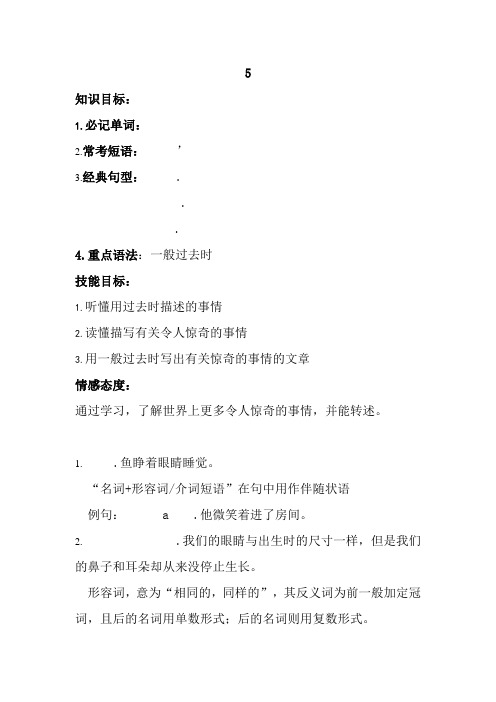
5知识目标:1.必记单词:2.常考短语:’3.经典句型: ...4.重点语法:一般过去时技能目标:1.听懂用过去时描述的事情2.读懂描写有关令人惊奇的事情3.用一般过去时写出有关惊奇的事情的文章情感态度:通过学习,了解世界上更多令人惊奇的事情,并能转述。
1. .鱼睁着眼睛睡觉。
“名词+形容词/介词短语”在句中用作伴随状语例句: a .他微笑着进了房间。
2. .我们的眼睛与出生时的尺寸一样,但是我们的鼻子和耳朵却从来没停止生长。
形容词,意为“相同的,同样的”,其反义词为前一般加定冠词,且后的名词用单数形式;后的名词则用复数形式。
例句: .我们的书包尺寸一样,但是颜色不同。
停止生长。
. 意为“停止做某事”例句:’s . .到了上课的时间了,请停止说话。
拓展: .意为“停下来去做某事”例句:I I a . 我累了,我想停下来休息一下。
3. ?意为“趣闻,有趣的事实”可数名词,意为“事实”;其复数形式为。
“事实上”。
.4.’t ? 难道这不令人惊奇吗?这是一个否定疑问句,用于表达说话人的看法,常翻译为“难道不……吗?”这种疑问句的回答也用简略回答。
即用或来回答。
如果答语是肯定的,就用,翻译为“不”;如果答语是否定的,就用,翻译为“是的”。
’t ? 难道那不对吗?’t.不,它是对的。
/是的,它不对。
5. . 她们转身去看,却什么也没有看见。
转身打开关掉放大;调高关小,调低翻到,转向打翻,翻身依次;轮流依次;轮流6. ?那儿有人吗?复合不定代词,意为“任何人”,多用于否定句或疑问句中指人某人任何人没有人每个人任何人每个人某人指物某事物任何事物没有东西一切事物注意:1.复合不定代词作主语,一般指单数概念,谓语动词用单数形式。
2.形容词修饰不定代词时要后置,作后置定语。
7. ? 发生了什么事?不及物动词,意为“发生”,多指偶然性发生。
不用于被动语态。
.意为“碰巧做某事”例句:I .我在街上碰巧遇见了一位老朋友。
7B Unit 5 Amazing things 知识清单
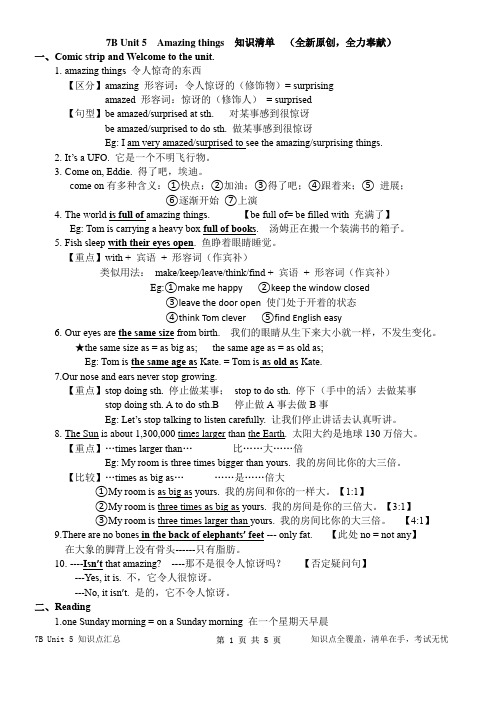
7B Unit 5 Amazing things 知识清单(全新原创,全力奉献)一、Comic strip and Welcome to the unit.1.amazing things 令人惊奇的东西【区分】amazing 形容词:令人惊讶的(修饰物)= surprisingamazed 形容词:惊讶的(修饰人)= surprised【句型】be amazed/surprised at sth. 对某事感到很惊讶be amazed/surprised to do sth. 做某事感到很惊讶Eg: I am very amazed/surprised to see the amazing/surprising things.2.It’s a UFO. 它是一个不明飞行物。
e on, Eddie. 得了吧,埃迪。
come on有多种含义:①快点;②加油;③得了吧;④跟着来;⑤进展;⑥逐渐开始⑦上演4.The world is full of amazing things. 【be full of= be filled with 充满了】Eg: Tom is carrying a heavy box full of books. 汤姆正在搬一个装满书的箱子。
5.Fish sleep with their eyes open. 鱼睁着眼睛睡觉。
【重点】with + 宾语+ 形容词(作宾补)类似用法:make/keep/leave/think/find + 宾语+ 形容词(作宾补)Eg:①make me happy ②keep the window closed③leave the door open 使门处于开着的状态④think Tom clever ⑤find English easy6.Our eyes are the same size from birth. 我们的眼睛从生下来大小就一样,不发生变化。
七年级英语感叹句知识点

七年级英语感叹句知识点英语中,感叹句是极为常见的一种句型。
使用感叹句,可以表达强烈的感情、观点或态度。
在学习英语的过程中,掌握感叹句的运用方法和规则是非常重要的。
本文将为大家介绍七年级英语感叹句的知识点,帮助大家更好地掌握这一句型。
一、感叹句的定义与特点感叹句是用来表达强烈感情或强调意义的句子。
它通常用于表示惊讶、赞叹、愤怒、高兴等情感。
感叹句的特点在于句子结构比较简单,只有主语和谓语,常常使用感叹词或者感叹短语来表达强烈的情感。
例如:- What a beautiful day it is!- How amazing his performance is!- Oh my goodness, I can't believe it!二、感叹句的结构感叹句的基本结构是:感叹词/感叹短语+ 主语+ 谓语+ 其他。
感叹词是指用于表达感情的词语,比如what、how、how many、how much等,而感叹短语是指用于表达强烈感情的短语,比如Oh my god、Wow、Good heavens等。
例如:- How beautiful the sunset is!- What a great idea you have!- Oh my god, what a disaster!三、感叹句的转换感叹句可以转换为陈述句或疑问句,这需要根据句子的语境和语气来确定。
以下是感叹句如何转换为陈述句和疑问句的说明:1. 感叹句转换为陈述句当感叹句中有形容词或副词时,可以将其转换为陈述句。
例如:- What a beautiful sunset it is! → The sunset is beautiful.- How kind he is to help me! → He is so kind to help me.当感叹句是以what或how many开头的时候,直接加上相关主语和谓语即可。
例如:- What a great idea you have! → You have a great idea.- How many students are in your class! → There are 30 students in my class.2. 感叹句转换为疑问句当感叹句的语气比较强烈时,可以将其转换为疑问句,以表达强烈的疑问或者批评。
7B英语 Unit5 Amazing things知识点归纳整理牛津译林版
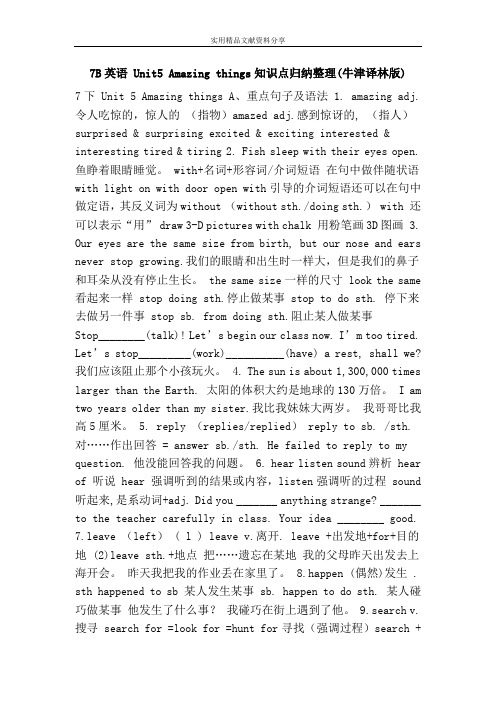
7B英语 Unit5 Amazing things知识点归纳整理(牛津译林版)7下 Unit 5 Amazing things A、重点句子及语法 1. amazing adj. 令人吃惊的,惊人的(指物)amazed adj.感到惊讶的, (指人)surprised & surprising excited & exciting interested & interesting tired & tiring 2. Fish sleep with their eyes open. 鱼睁着眼睛睡觉。
with+名词+形容词/介词短语在句中做伴随状语with light on with door open with引导的介词短语还可以在句中做定语,其反义词为without (without sth./doing sth.) with 还可以表示“用” draw 3-D pictures with chalk 用粉笔画3D图画 3. Our eyes are the same size from birth, but our nose and ears never stop growing.我们的眼睛和出生时一样大,但是我们的鼻子和耳朵从没有停止生长。
the same size一样的尺寸 look the same 看起来一样 stop doing sth.停止做某事 stop to do sth. 停下来去做另一件事 stop sb. from doing sth.阻止某人做某事Stop________(talk)! Let’s begin our class now. I’m too tired. Let’s stop_________(work)__________(have) a rest, s hall we? 我们应该阻止那个小孩玩火。
4. The sun is about 1,300,000 times larger than the Earth. 太阳的体积大约是地球的130万倍。
七年级英语:7b Unit 5 Grammar教案

初中英语新课程标准教材英语教案( 2019 — 2020学年度第二学期 )学校:年级:任课教师:英语教案 / 初中英语 / 七年级英语教案编订:XX文讯教育机构7b Unit 5 Grammar教案教材简介:本教材主要用途为通过学习英语的内容,提高学生的语言技能,增加一项语言能力,有利于国际化的日常交流、生活、工作等,本教学设计资料适用于初中七年级英语科目, 学习后学生能得到全面的发展和提高。
本内容是按照教材的内容进行的编写,可以放心修改调整或直接进行教学使用。
课题7b unit 5 grammar课型新授课教学目标1、学习can 与could在表示能力的使用2、学习can 与could 在表示可能性时的应用重难点分析教会学生如何理解运用区别can \could学情分析学生已经掌握一些关于情态动词的用法,但如何正确区别一些情态动词,学生还是不太明确教学方法情景教学法,归纳法教具准备课件教学步骤教师活动学生活动个性化补充step 1. warming up.1) make a survey.“what can you do now?”ask:can you ride a bike / swim / fly a kite / play football / play chess?yes , i can. / no, i can’t.2)show the students the following phrases on the screen.ride a bike swim fly a kite play football play chess 3)ask the other students in the class.can she / he …?4)show the students the sample on the screeneg: a. can he ride a bike?no,he can’t / yes, canstep 2. presentation.1) ask student again:could you ride a bike five years ago ?(help them answer:yes, i could./ no, i couldn’t.)2) get the students to ask the teacher about the past of a and b.could he / she …? (yes, he / she could. / no, he / she couldn’t.)3) teach the students to say the whole sentences:she could ridea bike five years ago.he couldn’t swim five years ago.……5) work out the rule.① positive: can could② negative: can’t couldn’t③question: can …? could …?step 3. practice.1) work alone.(part a1)2)get the students to report themselves like above.eg. can sandy row a boat now? could he do it last year?3)complete the conversation of part a2.5) explain:we can use am (is , are) able to replace can and was (were) able to replace could.eg.①mike can sing more than 20 english songs. mike is able to …②she could speak english when she was four.she was able to…step 4.ask 1) ask studentcan i borrow your pen ?can i open the window ?can i close the door?……could i borrow your pen ?could i open the window ?could i close the door?……2)比较can,may,could 表示可能性的用法step 5. guessing a riddle.it can live in water. it can breathe under water. it can swim. it can live in a glass bowl. people can feed and watch them every day. what is it? (a goldfish)step 6. presentation.1.say:①zhang hua works hard. it is possible for him to pass the exam.(he can pass the exam)② nick didn’t bring a football to school.it is not possible for us to play football after class.(we can’t play football after class.)③it was sunny last sunday. it was possible for the children to go to the park.(the children could go to the park)④millie hadno money yesterday. it was not possible for her to buy that coat. (she couldn’t buy that coat.)2.show the sentences above on the screen and explain them to the students:we use “can” / “could” to say that something is / was possible to happen.3. get the students to explain with “possible”. ①fire can be dangerous if we are not careful.②mr. sun can’t be at home because i saw him at school just now.③i didn’t lose my key so i could get in.④mr. sun could not get out because he hurt his leg.利用一些学生熟悉的短语,以can为提问方式与学生进行问答用第三人称换第二人称进行对话练习write them down on the blackboard.write the sentences down on the blackboardask the students to compare the sentences with can and could.ask them to draw the conclusion.巡视,帮助可能有困难的学生check the answercan和could分别表示现在和过去的能力我们在上册书中还学过表示征求意见的can, maywrite them down on the blackboardwrite them down on the blackboard也可以用学生的课堂状况作为语境show the sentences above on the screen use “can” to ask小组内分组练习ask the partner more questions like above and write down their answers , then report to the class.answer 让学生在组内写出更多的类似的句子总结can 与could的区别report themselves talk about the tables freely. in pairs.理解举例说明answer these sentences and make more完成单选练习guess 总结作业设计补充习题同步导学板书设计he can’t / cannot swim.…she could ride a bike five years ago.he couldn’t swim five years ago.can i borrow your pen ?can i open the window ?can i close the door?……could i borrow your pen ?could i open the window ?could i close the door?he can pass the examwe can’t play football after class.the children could go to the parkshe couldn’t buy that coat.XX文讯教育机构WenXun Educational Institution。
7B Unit 5 Reading 讲解
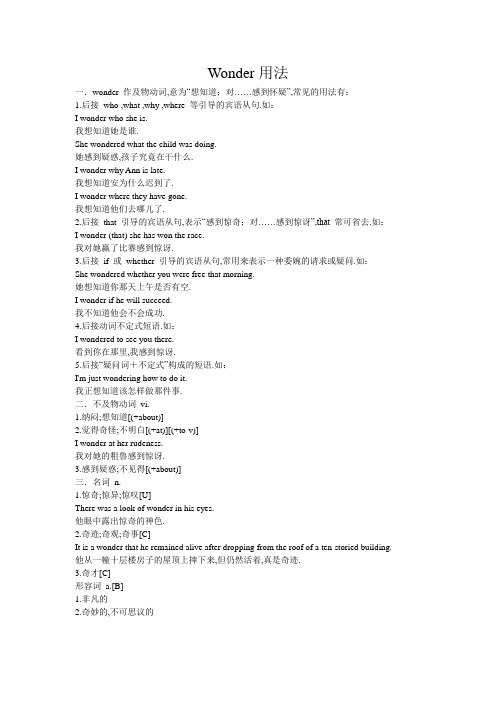
Wonder用法一.wonder 作及物动词,意为“想知道;对……感到怀疑”,常见的用法有:1.后接who ,what ,why ,where 等引导的宾语从句.如:I wonder who she is.我想知道她是谁.She wondered what the child was doing.她感到疑惑,孩子究竟在干什么.I wonder why Ann is late.我想知道安为什么迟到了.I wonder where they have gone.我想知道他们去哪儿了.2.后接that 引导的宾语从句,表示“感到惊奇;对……感到惊讶”,that 常可省去.如:I wonder (that) she has won the race.我对她赢了比赛感到惊讶.3.后接if 或whether 引导的宾语从句,常用来表示一种委婉的请求或疑问.如:She wondered whether you were free that morning.她想知道你那天上午是否有空.I wonder if he will succeed.我不知道他会不会成功.4.后接动词不定式短语.如:I wondered to see you there.看到你在那里,我感到惊讶.5.后接“疑问词+不定式”构成的短语.如:I'm just wondering how to do it.我正想知道该怎样做那件事.二.不及物动词vi.1.纳闷;想知道[(+about)]2.觉得奇怪;不明白[(+at)][(+to-v)]I wonder at her rudeness.我对她的粗鲁感到惊讶.3.感到疑惑;不见得[(+about)]三.名词n.1.惊奇;惊异;惊叹[U]There was a look of wonder in his eyes.他眼中露出惊奇的神色.2.奇迹;奇观;奇事[C]It is a wonder that he remained alive after dropping from the roof of a ten-storied building. 他从一幢十层楼房子的屋顶上摔下来,但仍然活着,真是奇迹.3.奇才[C]形容词a.[B]1.非凡的2.奇妙的,不可思议的surprise的用法1. surprise可做名词,基本用法如下:表示“惊讶”时,是不可数名词。
7B Unit 5 Grammar (2)教案
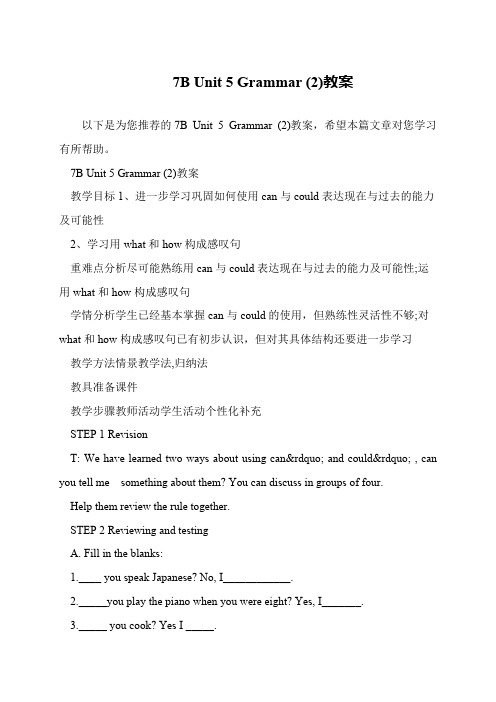
7B Unit 5 Grammar (2)教案
以下是为您推荐的7B Unit 5 Grammar (2)教案,希望本篇文章对您学习有所帮助。
7B Unit 5 Grammar (2)教案
教学目标1、进一步学习巩固如何使用can与could表达现在与过去的能力及可能性
2、学习用what和how构成感叹句
重难点分析尽可能熟练用can与could表达现在与过去的能力及可能性;运用what和how构成感叹句
学情分析学生已经基本掌握can与could的使用,但熟练性灵活性不够;对what和how构成感叹句已有初步认识,但对其具体结构还要进一步学习
教学方法情景教学法,归纳法
教具准备课件
教学步骤教师活动学生活动个性化补充
STEP 1 Revision
T: We have learned two ways about using can” and could” , can you tell me something about them? You can discuss in groups of four.
Help them review the rule together.
STEP 2 Reviewing and testing
A. Fill in the blanks:
1.____ you speak Japanese? No, I____________.
2._____you play the piano when you were eight? Yes, I_______.
3._____ you cook? Yes I _____.。
- 1、下载文档前请自行甄别文档内容的完整性,平台不提供额外的编辑、内容补充、找答案等附加服务。
- 2、"仅部分预览"的文档,不可在线预览部分如存在完整性等问题,可反馈申请退款(可完整预览的文档不适用该条件!)。
- 3、如文档侵犯您的权益,请联系客服反馈,我们会尽快为您处理(人工客服工作时间:9:00-18:30)。
7B Unit 5 感叹句语法讲义
一、感叹句用法:表示说话人的强烈的感情。
二、结构:
1.△What引导的感叹句的中心词是名词。
该名词前常有形容词修饰,句中的主语和
谓语一般可省去。
1)What a cold day
2)What an old house (it is)! 这间房子真老啊!
3)What nice air (it is)! 空气真好啊!
4)What delicious food (it is) !多好吃的食物啊!
5)What happy children (they are)!孩子们多快乐啊!
注:What结构中的名词若为单数可数名词,要用不定冠词a/an,而不用the;如句1)2);
若为复数或不可数名词(常见不可数名词:work, weather, fun, food,
news,information等),则不用冠词,如句3)4)5).
2. △How
6)How cold (it is
7)How happy (the children are)! 孩子们真愉快啊!
8)How hard (the student works)! 这个学生学习多努力啊!
9)How well (Mr Zhao teaches )!赵先生教得多好啊!
10)How happily (the boys are playing)!那些男孩们玩得多开心啊!
注:how 结构中主语如果是名词,常常前面要用定冠词the(比较第5和7两句);
6)7)两句是感叹形容词,8)9)10)是感叹副词。
三、同步练习题:(将下列句子改为感叹句)
1. Tom is a clever boy.
①What___________________________________________!
②How____________________________________________ !
2.The flower is beautiful.
①What___________________________________________!
②How____________________________________________ !
3.The book is very interesting.
①What___________________________________________!
②How____________________________________________ !
4.The weather is sunny.
①What___________________________________________!
②How____________________________________________ !
5.The work is very hard.
①What___________________________________________!
②How____________________________________________ !
6.Andy studies hard.
How____________________________________________ !
7.The girls are singing well.
How____________________________________________ !。
